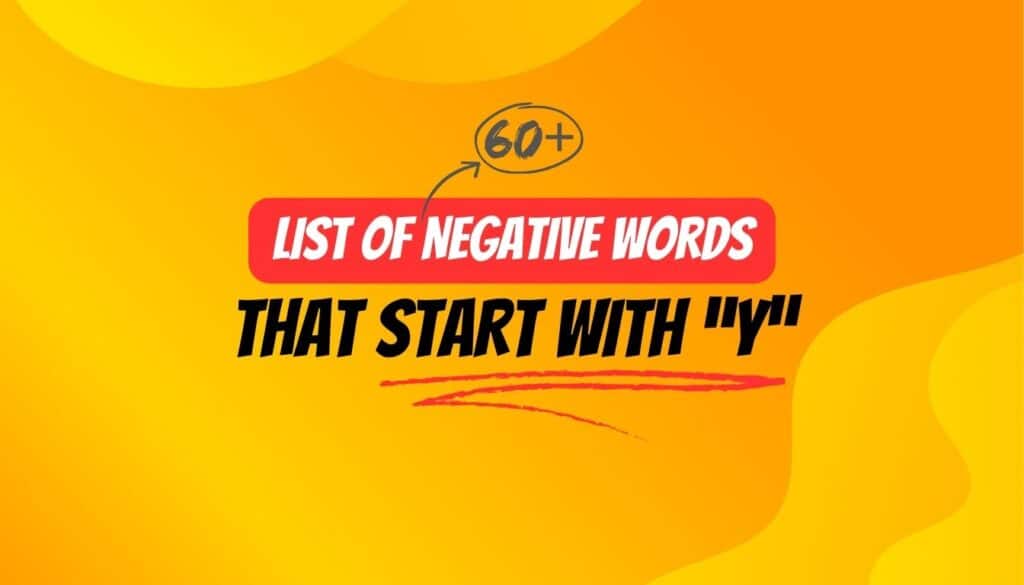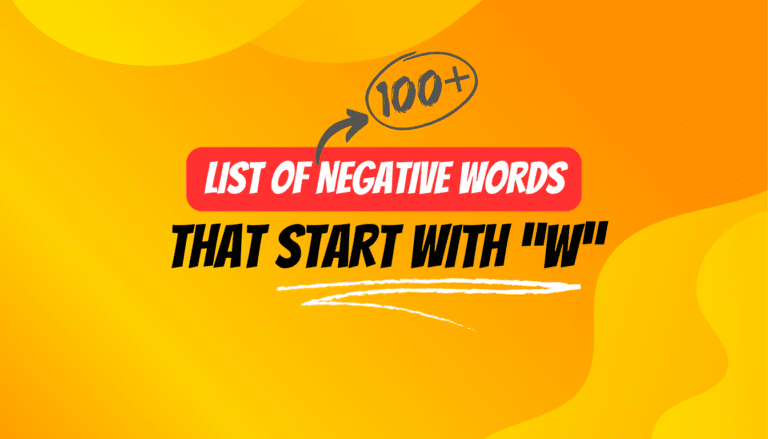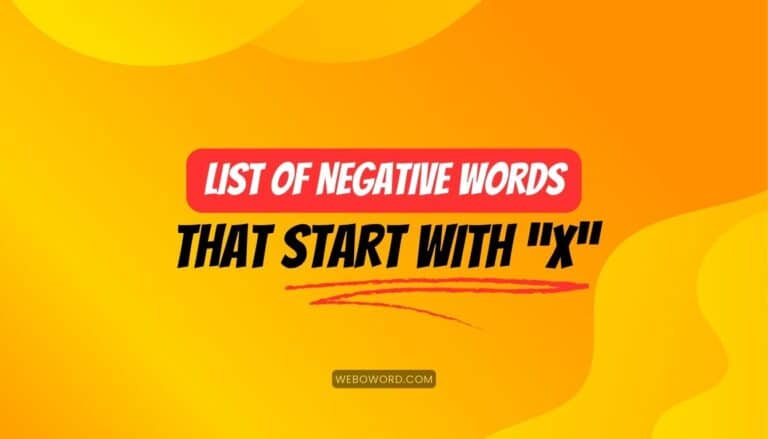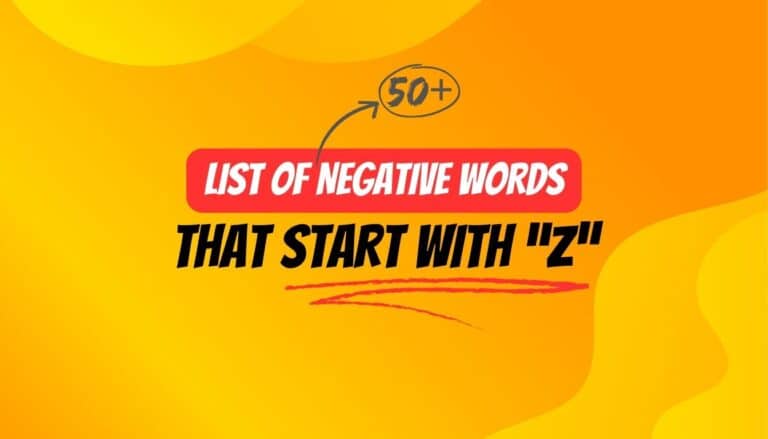In the vast expanse of the English language, each letter carries its own unique set of words that can express a spectrum of emotions, from joy and wonder to despair and disdain.
Today, we delve into the letter ‘Y’, uncovering its darker side with a collection of negative words.
This list offers a wide spectrum of negative words that start with Y. Each word is accompanied by a definition and contextual example to illustrate its use and impact.
From the mild annoyance of a ‘yammering’ noise to the deep discomfort evoked by ‘yucky’ textures, let’s jump right into the yellowness of these negative words starting with Y.
62 Negative Words That Start With Y
Here’s a list of negative words starting with “Y,” including definitions and contexts to illustrate their negative connotations.
We’ve included both words that are inherently negative and those that can have a negative connotation depending on the context.
- Yammer: Persistent complaining or whining, often in an annoying manner. Examples: “His yammer about office policies became tiresome.” and “He would yammer about his problems to anyone who would listen, often repeating the same grievances.”
- Yammerer: Someone who complains or talks tediously and persistently. Example: “The office yammerer could drain the energy out of any room with endless grievances.”
- Yammering: The act of complaining or whining persistently. Example: “Her constant yammering about the weather made her difficult to be around.”
- Yammeringly: Adverb describing the manner of yammering. Example: “He responded yammeringly to any critique, unable to accept feedback gracefully.”
- Yawp: To make a loud, harsh noise or to complain vociferously. Example: “Their constant yawping over minor inconveniences made it difficult to concentrate on work.”
- Yieldless: Stubborn or unyielding; not giving way to pressure. Example: “Her yieldless attitude during negotiations caused frustration among her teammates.”
- Yowl: To emit a long, mournful cry, as in pain, despair, or protest. Example: “The wounded animal yowled in the night, a haunting sound that disturbed the peace.”
- Yucky: Inducing a strong sense of disgust or revulsion; highly unpleasant. Example: “The yucky leftovers from last week’s party were a sorry sight in the kitchen.”
- Yieldless: Showing no compliance or flexibility; stubbornly resistant to change or persuasion. Example: “Her yieldless stance on the issue made any compromise impossible.”
- Yobbery: The behaviour or attitudes associated with yobs (uncultured, aggressive people); thuggish or antisocial behaviour. Example: “The town center on weekends was often marred by acts of yobbery.”
- Yokel: A derogatory term for an uneducated, unsophisticated person from the countryside. Example: “He was unfairly treated as a yokel by the city dwellers.”
- Yokelism: The state or quality of being a yokel. Example: “His yokelism was evident in his awe of the city’s tall buildings.”
- Yokelize: To make or become rustic and unsophisticated. Example: “The writer’s attempt to yokelize his speech made him sound inauthentic.”
- Yokelish: Behaving in a manner considered unsophisticated or provincial. Example: “His yokelish demeanour was often mocked in the cosmopolitan circles he aspired to join.”
- Yokeldom: The state or quality of being a yokel; unsophisticated or simple-minded behaviour. Example: “Despite his achievements, he couldn’t shake off the stigma of yokeldom attached to his rural origins.”
- Yarely: Obsolete or archaic, meaning eagerly; keenly. When used negatively, it can imply an overeager or rash manner. Example: “He yarely jumped into decisions without considering the consequences, leading to predictable disasters.”
- Yokefellow: While typically neutral, referring to a companion or colleague, it can negatively imply being unequally matched or burdened in a partnership. Example: “He found himself the yokefellow to a partner whose laziness put all the work on his shoulders.”
- Yaffle: To eat or drink noisily or greedily, often invoking a negative image of manners. Example: “He yaffled his food without regard for the disgusted looks from other diners.”
- Yelp: To emit a sharp, high-pitched cry, often in pain, fear, or complaint. Example: “The customer’s yelp of dissatisfaction was loud enough to draw attention from across the store.”
- Yellow: Cowardly or fearful. Example: “His yellow refusal to stand up for his friends disappointed everyone.”
- Yesteryear: Used to denote nostalgia, but negatively, it can imply an unhealthy clinging to the past. Example: “His ideas, stuck in yesteryear, were out of place in the modern world.”
- Yoke: To burden or enslave. Example: “The unfair contract yoked him to a company that exploited his talents without proper compensation.”
- Yawn: A sign of boredom or disinterest. Example: “Her presentation was met with yawns, a clear sign that the audience was disengaged.”
- Yapping: To talk noisily and continuously. Example: “The constant yapping from the next room made it impossible to focus.”
- Yielder: One who gives way under pressure or is easily influenced. Negatively, it implies weakness or lack of backbone. Example: “As a yielder, he could never say no, even when it was in his best interest.”
- Yield: While often seen in positive or neutral contexts, negatively, it can imply surrendering under pressure or failing to withstand challenges. Example: “Under the slightest opposition, he would yield, showing a lack of resilience.”
- Yelping: Emitting short, sharp cries, often in a manner that is annoying or demanding attention. Example: “The yelping dog outside was a persistent distraction throughout the night.”
- Yeasty: While typically relating to fermentation, metaphorically, it can suggest something unsettled or superficially active. Example: “His yeasty ideas seemed promising but lacked substance upon closer inspection.”
- Yokeless: Free from restraint or control, but in a negative context, it can imply a lack of responsibility or direction. Example: “His yokeless lifestyle led to a series of poor decisions with serious consequences.”
- Yearnful: Filled with longing or desire, which can be negative when it denotes an unhealthy or unattainable obsession. Example: “Her yearnful obsession with achieving perfection took a toll on her mental health.”
- Yappingly: Characterized by or engaging in yapping; noisily and annoyingly talkative. Example: “He responded yappingly to every suggestion, never offering constructive feedback.”
- Yokelry: The qualities or characteristics of yokels; often used to describe behavior deemed unsophisticated or naive. Example: “Despite his achievements, he was often dismissed due to perceived yokelry.”
- Yob: A British slang term for a young man who behaves in a very rude, loud, and sometimes violent manner. Example: “The neighborhood yobs were known for causing trouble after dark.”
- Yieldingly: Acting with compliance or readiness to accommodate; negatively, it can suggest a lack of firmness or decisiveness. Example: “She acted yieldingly to every demand, never standing up for her own needs.”
- Yonderly: Distant or removed; negatively, it can refer to someone who is emotionally detached or absent. Example: “His yonderly manner made him seem aloof and unapproachable.”
- Yuppify: To make more upscale or yuppie-like, often with a negative connotation of gentrification and loss of character. Example: “The once vibrant neighborhood was slowly yuppified, losing its original charm.”
- Yielder: One who gives way or surrenders easily; negatively, it implies weakness or lack of courage. Example: “In every dispute, he was the yielder, never fighting for his rights.”
- Yowl: A loud wail of pain, distress, or anger, evoking negativity or discomfort. Example: “The prisoner’s yowls echoed through the cold, dark corridors.”
- Yucky: Eliciting a strong sense of disgust or revulsion; highly unpleasant. This word is already listed, emphasizing its common recognition and usage in expressing disgust.
- Yokelishness: The state of being a yokel; characterized by naivety or rustic manners, often used derogatorily. Example: “His yokelishness was apparent in his awe of the city’s skyscrapers.”
- Yackety-yak: Tedious, lengthy talk without substantial content. Example: “The meeting was full of yackety-yak, leaving no time for meaningful discussion.”
- Yahoo: A crude, brutish, or uncivilized person. Example: “He behaved like a yahoo at the formal dinner, embarrassing everyone.”
- Yahooism: The behavior characteristic of a yahoo; uncouth or aggressive. Example: “His yahooism at social events was notorious.”
- Yahoos: Plural of yahoo, referring to a group of uncivilized or brutish people. Example: “The group of yahoos caused chaos downtown.”
- Yak: A noisy, boisterous person, often talking excessively. Example: “The bar was impossible to enjoy with the yak dominating the conversation.”
- Yank: To pull something abruptly. Negatively, it can imply a lack of care or finesse. Example: “He yanked the door open, breaking the handle.”
- Yawn: Expressing boredom or disinterest. Example: “The lecture was such a yawn that half the students were asleep.”
- Yawner: Something that is exceedingly boring or uninteresting. Example: “The film was a yawner, with a plot that moved at a glacial pace.”
- Yawp: Loud, harsh cry; complaining vociferously. Example: “He let out a yawp of frustration when he saw the traffic jam.”
- Yell: To scream or shout, often in anger or fear. Example: “Her yell could be heard across the parking lot.”
- Yellowbelly: A derogatory term for someone who is cowardly. Example: “He was called a yellowbelly for not standing up to the bullies.”
- Yikes: An exclamation of surprise or fear, though not inherently negative, can reflect alarm or concern. Example: “Yikes, that was a close call with the nearly missed accident.”
- Yips: Nervousness or tension that causes a person to fail at a task they’re usually proficient in. Example: “The golfer’s sudden yips cost him the championship.”
- Yoke: To oppress or burden someone. Example: “They were yoked by debt and unable to pursue their dreams.”
- Youngling: A young person or animal, often inexperienced or naive. Example: “The younglings were easily fooled by the trickster.”
- Yowl: A long, mournful cry of pain, distress, or anger. Example: “The cat’s yowl was a nightly disturbance.”
- Yuck: Expressing strong distaste or disgust. Example: “Yuck, I can’t believe you eat that!”
- Yuckiness: The state of being disgusting or repulsive. Example: “The yuckiness of the spoiled milk made her gag.”
- Yuckster: Someone who makes or appreciates disgusting jokes or comments. Example: “He was known as the office yuckster, always ready with a gross-out story.”
- Yucky: Repulsive or disgusting. Example: “The yucky mud clung to their shoes after the hike.”
Wrapping Up
There you go!
Do you know of other words that start with the letter “Y” and carry a negative connotation that is not included on our word list? Drop a comment below.




